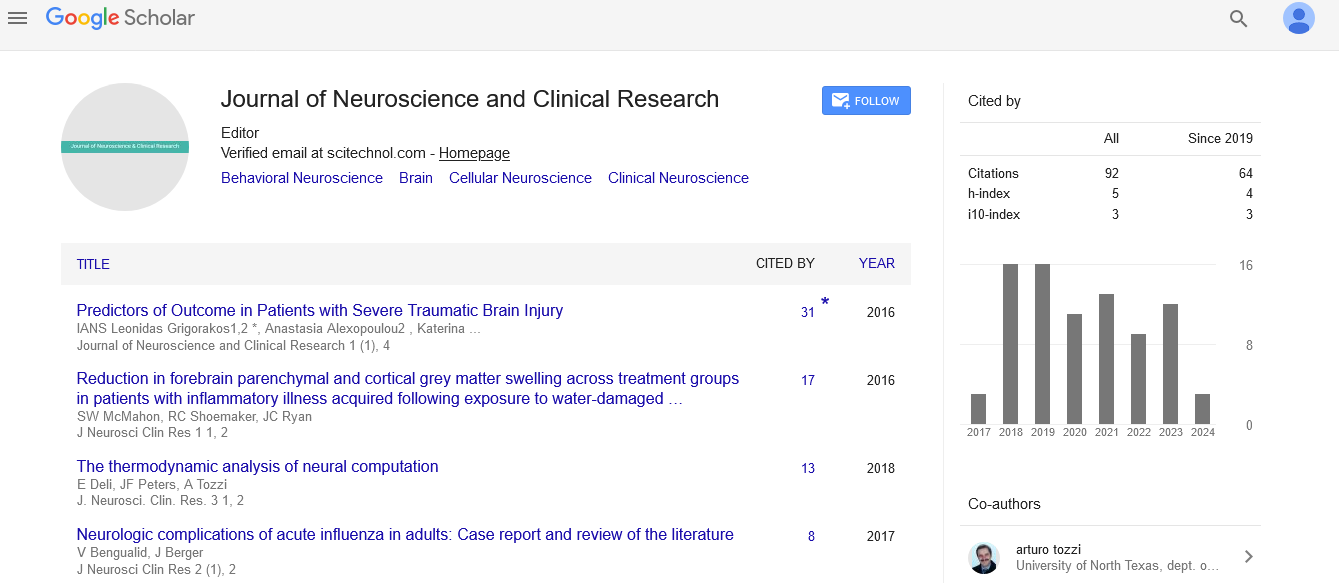Perspective, J Neurosci Clin Res Vol: 8 Issue: 2
Neuropsychological Perspectives on Neurodegenerative Disorders: Implications for Diagnosis and Treatment
Fu Chi Yang*
Department of Ophthalmology, Harvard Medical School, Boston, United States of America
*Corresponding Author: Fu Chi Yang
Department of Ophthalmology, Harvard Medical School, Boston, United States of
America
E-mail: fcyang@gmail.com
Received date: 29 May, 2023, Manuscript No. JNSCR-23-106758;
Editor assigned date: 31 May, 2023, PreQC No. JNSCR-23-106758 (PQ);
Reviewed date: 14 June, 2023, QC No. JNSCR-23-106758;
Revised date: 21 June, 2023, Manuscript No. JNSCR-23-106758 (R);
Published date: 28 June, 2023, DOI: 10.4172/Jnscr.1000157
Citation: Yang FC (2023) Neuropsychological Perspectives on Neurodegenerative Disorders: Implications for Diagnosis and Treatment. J Neurosci Clin Res 8:2.
Description
Neurodegenerative disorders, such as Alzheimer's disease, Parkinson's disease, and Huntington's disease, pose significant challenges to individuals and society alike. In recent years, the field of neuropsychology has made remarkable strides in understanding the cognitive and behavioural manifestations of these disorders. By examining the cognitive changes associated with these conditions, clinicians can improve diagnostic accuracy, develop targeted interventions, and enhance the quality of life for affected individuals.
Neuropsychological assessment
Neuropsychological assessment plays a pivotal role in diagnosing neurodegenerative disorders. By evaluating cognitive functions such as memory, attention, executive functions, language, and visuospatial abilities, clinicians can identify patterns of impairment that are indicative of specific conditions. For example, in Alzheimer's disease, memory deficits, particularly in episodic memory, are often observed in the early stages. In Parkinson's disease, executive dysfunction, including difficulties with planning, decision-making, and problem-solving, is commonly observed. Huntington's disease typically involves impairments in motor control, cognition, and behaviour.
In addition to cognitive assessment, neuropsychologists also evaluate mood, personality changes, and psychosocial functioning, as these aspects can significantly impact the overall presentation and progression of neurodegenerative disorders. Comprehensive neuropsychological evaluations help in differential diagnosis, ruling out other possible causes, and providing a more accurate understanding of the individual's cognitive profile.
Treatment implications
Neuropsychological perspectives have important implications for the treatment of neurodegenerative disorders. Firstly, early detection and accurate diagnosis allow for timely intervention. Pharmacological treatments, such as cholinesterase inhibitors for Alzheimer's disease or levodopa for Parkinson's disease, can be initiated at an early stage to manage symptoms and potentially slow down disease progression. Neuropsychological assessment aids in monitoring treatment response and adjusting medication regimens accordingly.
Furthermore, a deeper understanding of the cognitive changes associated with neurodegenerative disorders allows for the development of targeted cognitive interventions. Cognitive rehabilitation programs, focusing on specific domains such as memory or executive functions, can help individuals optimize their remaining cognitive abilities and develop compensatory strategies. These interventions often involve techniques such as memory training exercises, attentional exercises, and problem-solving tasks tailored to the individual's needs. By harnessing neuroplasticity, individuals can potentially improve cognitive functioning or minimize the impact of cognitive decline on their daily lives.
Neuropsychology also contributes to the development of non-pharmacological interventions. For instance, cognitive stimulation therapies, which involve engaging individuals in mentally stimulating activities and exercises, have shown promise in slowing cognitive decline and enhancing overall cognitive functioning. Additionally, behavioural interventions, such as promoting physical exercise, maintaining social connections, and managing stress, have been associated with positive outcomes in neurodegenerative disorders.
Importantly, neuropsychological assessment helps in identifying potential cognitive and psychological comorbidities. Depression, anxiety, and apathy are common in neurodegenerative disorders and can significantly impact an individual's well-being. By recognizing and addressing these comorbidities, clinicians can improve the overall treatment plan and enhance the individual's quality of life.
Conclusion
Neuropsychological perspectives on neurodegenerative disorders offer valuable insights into their diagnosis and treatment. By employing comprehensive neuropsychological assessments, clinicians can accurately identify cognitive profiles associated with different conditions, aiding in differential diagnosis and timely interventions. This knowledge allows for the implementation of pharmacological treatments, cognitive rehabilitation programs, and non-pharmacological interventions, tailored to the individual's needs. Additionally, addressing comorbidities such as depression and anxiety contributes to a holistic approach in managing neurodegenerative disorders.
Continued studies in neuropsychology, combined with advances in neuroimaging and biomarker studies, holds promise for further enhancing the understanding of neurodegenerative disorders. By leveraging this knowledge, one can strive for early detection, personalized treatment plans, and improved quality of life for individuals affected by these challenging conditions.
 Spanish
Spanish  Chinese
Chinese  Russian
Russian  German
German  French
French  Japanese
Japanese  Portuguese
Portuguese  Hindi
Hindi 